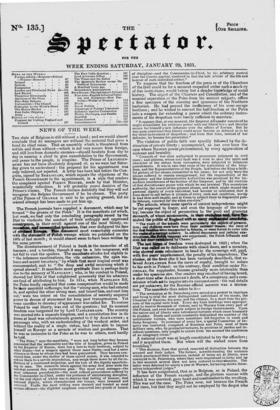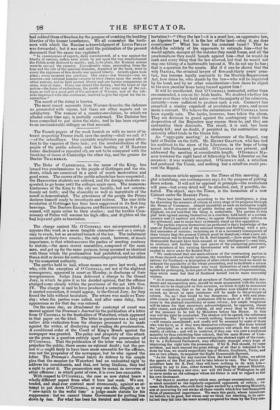The French journals have, supplied a document, which may be
termed "the groans of the Po/es.' It is the manifesto (of which, last week, we had only the concluding paragraph) issued by the Diet to vindicate the conduct of their unhappy and oppressed their revolt against one of the most bloody, re- laccosetifled tyrannies, that ever disfigured the face of- • This document most remarkably coincides with the Statement of -Polish wrongs which we published on the 18th of las- t month ; it would almost seem to have been written by the same, person. The dismemberment Of Poland is fresh in the memories of all freemen ; and • a tenible, though it may be a late vengeance, will not fail to visit the spoilers. The manifesto alludes but slightly to 'the infamous machinations, the vile calumnies, the open vio- lence and secret treachery," by which that most tragical event was consummated, and .to "the deep and awful mourning which it spread abroad' It manifests. more gratitude than is perhaps fairly due to the memory of NAPOLEON ; who, in his conduct to Poland, showed but little of that enlightened generosity that his admirers are fond of attributing to him. In 1814, when NAPOLEON fell, the Poles fondly expected that some compensation would be made for tikeir manifold sufferings; but the "strong men, who had entered in, and spoiled the other strong man, and bound him, and cast him out;' were too intent on the consolidation of recently acquired power to dream of atonement for long past transgressions. Yet some sacrifice to decency of appearance was called for. To restore Poland to real liberty, was out of the question; but its nominal freedom was bargained for by Lord CASTLEREAGH. The country was erected into a separate kingdom, and d constitution free in its forms at least was ostentatiously granted to it by ALEXANDER; a personage who, with -an understanding of the weakest order, and without the reality of n single, virtue, had been able to impose himself on Europe as a miracle of wisdom and goodness. That he was as insincere to the Poles as he was to others, need hardly be told. ; • . '
"The Poles," says the manifesto, "were not long before they became convineed that the nationality and the title of kingdom, given to Poland bythe EmPeror of Russia, were but a lure to their brethren subject to other States—but a weapon against those same States—and a mere chimera to those to whom they had been guaranteed.. They became con- vinced that under the shelter of these sacred names, it was intended to reduce them to a servile degradation, and weigh them down by all the in- flictions of a continued despotism, and the loss -of the dignity appertain- ing to man. The measures taken against the army first drew aside the -veil that covered this mysterious plan: - The most cruel outrages—the most infamous .punishments—the most, refined persecutions ordered by the Commander-in-Chief, under the pretence of maintaining 'discipline, but the real object of which Was to destroy that feeling of honour, that national dignity, which 'characterizedour troops,' were invented and enforced. Faults the most trifling were deemed and treated as most serious offences—the 'slightest suspicion converted into proofs of breach of discipline—and the Commander-in-Chief, by his arbitrary control over the Courts-martial, rendered in fact the sole arbiter of the life and honoor of each individual soldier."
To 'suppose that the freedom of the press or of the Chambers of the Diet could be for a moment respected under such a mockery of free institutions, would betray but a slender knowledge of social history. The object of the Charters and Constitution, and of the nominal separation of the Poles from his 'ancient subjects, offers a fine specimen of the cunning and ignorance of the Northern barbarian. He had proved the inefficiency of his semi-savage brethren ; and he wished to convert the half-freedom of the Poles into a weapon for extending a power which the ordinary instru- ments of his despotism were barely sufficient to maintain.
" It appears that, at one moment, the Emperor Alexander conceived he might consolidate his arbitrary power with our liberal law, and thereby secure for himself a'new influence over the affairs of Europe. But he was soon convinced that liberty could never become so debased as to be the blind instrument of despotism ; and from that time, instead of her defender, he became her persecutor."
The violation of public faith was speedily followed by the de- struction of private liberty ; accompanied, as has ever been the case where Russian power predominated, by every aggravation of violence and brutality. '• Councils of 1,var were authorized to pronounce. judgment in -civil cases; and citizens. whose only fault was a wish to save the spirit and character of the nation' from corruption, were subjected to infamous punishenents. It was in vain that some of-the Authorities' of the king- dom, and the Representatives of the People, laid before.the King a faith- ful picture of the abuses committed in his name; for not only were the abuses suffered to remain unsuppressed, but the responsibility of the Ministers and the Administrative Authorities was paralysed by the im- mediate interference of the brother of the' Emperor, and by the exercise of that discretionary power with which he was invested. This monstrous authority, the source of the greatest abuses, and which might wound the personal. dignity of every individual, had become, infatuated, that it even dared to call-before it citizens of every rank- and cpndition, merely to load them wilkinsults, Find at times to subject theta to disgraceful pub- lie labours, reserved for the Vilest convicts." • • • - , • • • The schools, -Where Senile spark's of aribient independence might be yet supposed to linger, and even the language of the coun- try, -became the -oliect of persecution to the . and .gracious monarch, of whom. missionaries, in tiler ftwair- 444he4 that public of England with so many - anecdotes.
'"•-n-ie youth of the schools were particularly the objects of persecu- firm ; nor children were torn from their mothers' breasts: the issue of the first families were transported to Siberia, or were forced to enter into the raakkainca_ resapt soldiery. In official documents and judicial exa- minationit,t/as. language was suppressed; the Polish tribunals and civil Is* werelnissibilated by Ukases.'
The last fortes of freedom were destroyed in 825 ; when the Diet was celled on to deliberate with closed doors, and a member, who showed some reluctance to bend to the sovereign will, paid, with five years' imprisonment, the penalty of his imprudence., The chalice, or the fever (for it has been variously described), that re- lieved ALEXANDER from the cares of royalty, brought no solace . to his serfs in Poland: on the contrary, their condition under Nx- CHOLAS, the supplanter, became gradually more intolerable than under his specious sire. Our readers may recollect of having heard, . a short-time after ALEXANDER'S death, of a conspiracy, and a com- mission which sat to inquire into its circumstances : the real details are yet unknown, for the Russian official account was a fabrica- tion. The manifesto thus refers to it- " The revolution at St. Petersburg even served as a pretext to imprison and bring to trial the most distinguished individuals of the senate, the Chamber of Nuncios, the army, and the citizens. In a short time the pri- sons of the capital were fided. Every day fresh buildings were appropri- ated to receive thousands of victims, sent to Warsaw from every part of Old Poland, and even from parts subject to foreign Governments. Upon the native soil of liberty were introduced tortures which cause humanity to shudder. Death and suicide constantly diminished the number of the unfortunate victims, who were sometimes left forgotten in small and clanip dungeons. In contempt of every law, a special Committee. of In- quiry was instituted, composed of Russians and Poles, most of them military men, who, by protracted tortures, by promises of pardon and in. sidious questions, only sought to extort from the accused the confession of an imaginary crime." A national court was at length constituted to try the offenders; and it acquitted them. But when will the wicked cease from troubling?
'
"This decision, from that period, removed all distinction between the - accused and their judges. The former, notwithstanding the sentence which proclaimed their innocence, instead of being set at liberty, were . conveyed to St. Petersburg, where they were imprisoned in forts; and up to this moment- several have not been restored to theiriamilies. The latter were detained for nearly a year at Warsaw, for having shown them-
selves independent judges." .
Whas been conjectured, that as in Belgium, so in Poland, the influence 'of the French example, and the glorious success with . which it was crowned, gave heart and combination to the revolters. This was not* . ease. The Poles rose, not because the French had risen, but that they might not be employed by the despot who had robbed them of freedom for the purpose of crushing the budding liberties of the former benefactors. We all remember the tardi- ness with which the Russian acknowledgment of Louis PHILIP was forwarded ; but it was not until the publication of the present document that the cause was explained.
"In consequence of reports, daily corroborated, of a war against the liberty of nations, orders were given to put upon the war establishment the Polish array destined to march ; and, in its place, the Russian armies were to occupy the country. Considerable sums, proceeding from the loan and the sale of the national domains, deposited at the bank, were to cover-the expenses of this deadly war against liberty. Arrests again took place ; every moment was precious. Our army—our treasure—our re- . sources—our national honour—averse to rivet chains upon the necks of other nations, and to fight against liberty and our former companions in arms, were at stake. Every one shared this feeling ; but the heart of the nation—the focus of enthusiasm, the youth of the army and of the col- leges, as well as a great part of the garrison of Warsaw, and of the citi- zens impressed with this sentiment, resolved to give the signal for the in- surrection."
The result of the rising is known. The most recent accounts from 'Warsaw describe the defences as prosecuted with vigour, but there are other reports not so satisfactory. The rumour of a counter-revolution, to which we alluded some time ago, is partially confirmed. The Dictator has been compelled to put down the clubs, and he has been exposed to no inconsiderable obloquy on that account.



























